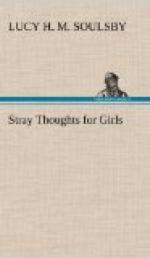But although I must allow reading to be my special hobby,—one, however, which is run very hard in my affections by both cooking and gardening,—still I quite appreciate other hobbies, and I should be quite as much pleased next term if, instead of telling me about books read and bringing me a piece of poetry learnt (by-the-by, I do very much wish you would all learn Wordsworth’s “Ode to Duty” during the holidays)—if, instead of this, you showed me collections of wild flowers or shells. A little time ago I saw a charming book of dried flowers, collected by a set of children just out of a kindergarten. Each flower had a page to itself, with its name neatly written, and any extra local names which it happened to possess. On the opposite page was written any verses of poetry that the children could find about it; and I was quite surprised to see what a good collection they had of bits from Tennyson and Shakespeare and Wordsworth, etc. Of course, the older sisters and the mothers must have helped them in this part, but such a book, made in the holidays, would be the work of the whole family, so you would have plenty of help; and you will notice that the poetical part of it is a special attraction to me, as it affords exercise to my own hobby both in reading and in verifying quotations.
I think I had better here give you warning that when you come back next term every one will have to write an essay, describing some one place they have been to during the holidays. I tell you now, that you may try to find out all you can of the real interest of the place; its historical, or legendary, or literary associations, or its flowers, or shells, or fossils.
There is one other point of holiday-making on which I should like to talk to you. Some of you may have read Charles Lamb’s amusing essay on “Popular Fallacies;” I suppose every one could add to his list from their own experience of life. One of the popular fallacies I should like to combat is, that “holidays are ‘the children’s hour;’” though I quite allow that, like most popular fallacies, it has many grains of truth in it. The little victims consider that conscientious application to grammar and history deserves a compensating course of lying in bed in the morning, sitting up late at night, and general indulgence, with every right-minded member of the household waiting upon them, and making plans for their amusement. Now, I quite see their side of the question. It is not pleasant, day after day, to go on steadily with work, which you do not happen to care for; to be cut off from this or that expedition, because lessons interfere; to have to get up early every morning; to lose this or that visit;—and, therefore, I hope your holidays may be full of fun, and that you may be richly rewarded for any struggles you may have made during the term.




